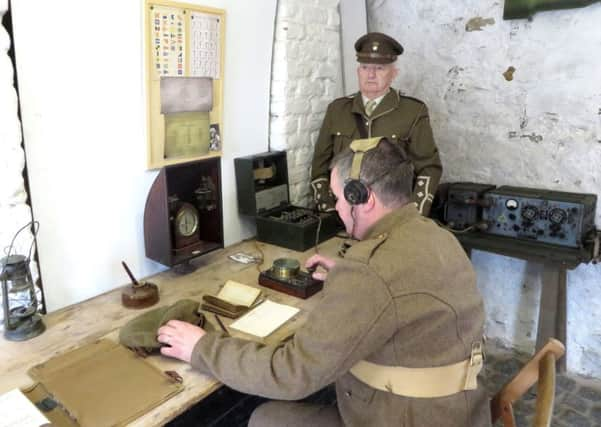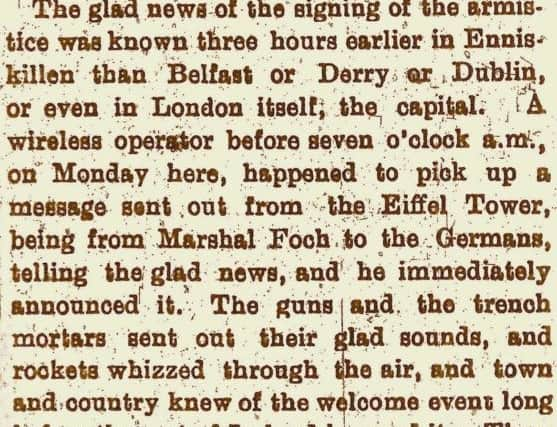Enniskillen celebrated end of war before rest of the UK


The news reportedly broke in the Co Fermanagh town before it did in London, Edinburgh, Manchester or Dublin on November 11, 1918 thanks to a local wireless operator.
The message had been sent from Paris by the Armed Forces Commander in Chief, Marshal Ferdinand Foch, announcing the time for the cessation of hostilities.
Advertisement
Hide AdAdvertisement
Hide AdIt read: “Hostilities will cease on the whole front from November 11, at 11 o’clock.


“The Allied troops will not, until further orders, go beyond the line reached on that day and at that hour.”
Historian Selwyn Johnston said there had been an “element of luck” that a radio operator at an army barracks in Enniskillen had picked up the message so quickly.
“The radio operator was on standby, sensing that news was imminent,” he told the Press Association.
Advertisement
Hide AdAdvertisement
Hide Ad“The conditions permitted that the message was strong enough to be picked up in Enniskillen.
“He was able to translate the message from French to English.
“He immediately reacted to the news and fired skyrockets into the air and ran to the parish church, through the back streets which had been come to be known as the Dardanelles, to ring the bells.
“The bells rang before 7am and proclaimed the Armistice, three hours before Dublin, Belfast, London or Edinburgh.
Advertisement
Hide AdAdvertisement
Hide Ad“In fact many of the other radio operators from the towns and cities contacted Enniskillen to confirm what they had heard, because they had not picked up the message.
“Services of thanksgiving were quickly held that morning, even before other towns and cities were aware of the news.”
The local newspapers at the time reported that the news “spread like wildfire”, and was accompanied by the firing of guns, the launch of rockets from the military barracks and the pealing of church bells.
The streets were bedecked with flags, the pupils of Portora Royal School lit a bonfire on the hill at the school and formed a torchlight procession.
Advertisement
Hide AdAdvertisement
Hide AdMr Johnston said that Enniskillen had been first with the news was well known in 1918, but over the decades had slipped out of general knowledge.
“During my research when I examined the newspapers of the time I was amazed to find that Enniskillen was the first town in the UK to proclaim the armistice,” he said.
Mr Johnston said the bells had not been rung in the churches since the start of the First World War, so their ringing caused huge excitement.
“Unfortunately the armistice was too late for some, and the newspaper records one woman, amidst the rejoicing on hearing the good news, sharing that she had just received a telegram that morning to say that her son had been killed.
Advertisement
Hide AdAdvertisement
Hide Ad“How sad to lose your life in the final days and hours before the Armistice,” he said.
“It’s hard to imagine a time with no mobile phones, televisions or computers when morse code messages, skyrockets, bells and posters were the only means of communicating.”
This year Enniskillen will mark Armistice Day with a series of events starting at 6am at the castle, when 1,000 pipers will play When the Battle’s O’er, a traditional tune played after battle.
The Inniskillings Museum curator-manager Neil Armstrong said: “Armistice morning before sunrise at the iconic Enniskillen Castle will be an evocative start to our community commemorations.”
A lasting legacy of the event will be the lighting of the cathedral clock (for the first time) which will remain a beacon of hope for future generations.